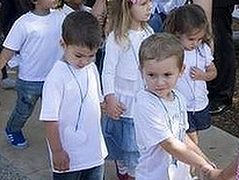“We have a problem: our son is friends with a boy next door. His parents are totally worldly people—they don’t go to church, they watch television constantly, and their son plays computer games….”
“But that’s the way most of us live in just such neighborhoods. What’s the problem?”
“They hang around with each other outdoors, and our son hears about these games and about various TV programs. What if he’s invited to go over there, and then he actually sees all this? Is it worth it for them to keep associating?”
“What do you suggest—forbidding your child to play with the neighbor?”
“I don’t even know, myself… Of course he needs friends, but… I don’t want him to see and hear all this… What should I do?”
“It’s your family who brings up your child, not his friends—although sometimes it’s the other way around. Your son spends much less time with his friend than he does with you. So be an example of the Christian life for him—all the more so what with your husband being a believer, and your other relatives.”
“We understand that, but all the same…. on the street… I worry about our son…”
Thoughts out loud
I had approximately the same conversation with an acquaintance of mine, a young mother. There was more to the conversation than that, of course, but we won’t go into the more personal details. The main thing was that the problem was identified: the relations of children from religious families and families that are not religious, and if you look deeper—the relations of the families themselves; and yet deeper and deeper: the believing family and… everything else.
Indeed, Orthodox Christian[1] parents try with all their might to protect their children from bad influences—the television, the computer, and much more. Of course, at times you just can’t do without the computer or television, but the most important thing is that the adults themselves turn on the infamous “boob tube” as infrequently as possible and not to let the hours fly by sitting in front of the computer monitor. But it can be so difficult to resist sometimes: you go online for a minute “on business” and as luck would have it an old schoolmate appears on line… And there goes your precious time. It’s important not to forget: when you protect your children from something, you have to protect yourself from the very same thing. I think that the effect, then, will be far greater. The child has to see what exactly the parents are interested in. A simple example: I don’t think that many parents who smoke would be very happy if they suddenly found out that their school-age children had “tried” cigarettes. But would it be an effective prohibition if the children saw their parents’ bad example? This is why the double standard “grown-ups are allowed but children aren’t allowed” doesn’t work here. Christian rules are given for all—both for children and for adults. But there will be one main rule: adults’ personal lives cannot contradict the upbringing of their children.
To associate or not associate?
Nevertheless, what should we do? You can’t, in fact, answer this question unequivocally. But you’re not going to forbid your child to associate with his peers! To protect a child from associating with everyone who doesn’t go to church, from all non-Orthodox or unbelieving children is simply impossible. There are, however, not only Sunday schools and Orthodox high schools (gymnasia), but also Orthodox kindergartens, supplemental development groups, and even Orthodox sports groups. It is difficult to argue with the fact that this helps a great deal in bringing up children. A child is in a natural—if I may use the expression—“habitat”: prayer and participation in church services. Only, is it true that all children of religious parents—and the parents themselves—do not watch television, do not play computer games, and do not suffer from bad habits? That is another question. “Believing”—as much as we would like to have it otherwise—does not mean “sinless.” “Be ye perfect, even as your Father in Heaven is perfect” (cf. Mt. 5:48). The Lord did not say, “You are already perfect.” He gave a direction. And knowing that direction, you need not only to not stray from the path; even more important is not to think that you have advanced further on this path than is in fact the case: “I thank Thee, O Lord, that I am not like other men. I do not watch television, I do not play video games…”
Therefore the question should not be asked thus: “Should or shouldn’t the faithful associate with unbelievers?” but thus: “How can the faithful be firmly established in their faith and not fall away even in small things?”
Light in the darkness
“You are the salt of the earth… You are the light of the world. A city that is set on a hill cannot be hid” (Mat. 5:13-14). How nice it would be to escape from the surrounding world with its temptations, vices, and all the other things that it contains! But the Lord Jesus Christ calls us to something else—to be light and salt, a city on a hill. To put it simply, to be a Christian and to witness about this to all who are not yet Christians. Light is essential in order to light up the darkness, in order to see the road. It is possible to grope your way even in complete darkness, but can you go far like this?
Each of us, each Christian, can become such a lamp for all those who have not yet seen the light of Christ. Therefore we need to stop being afraid that someone bad will have an influence on us or our children, but rather we need to be that influence ourselves.
“Neither do men light a candle, and put it under a bushel, but on a candlestick; and it giveth light unto all that are in the house” (Mat. 5:15). With the candle of our faith, the Lord can light the hearts of other people, too, especially of those around us. But if we are afraid that someone might put out our candle (because not everything is so calm and tranquil on the sea of life—sometimes there are both heavy rains and high winds), then the most important thing is prayer that the Lord would keep this little flame going. “Let your light so shine before men, that they may see your good works, and glorify your Father which is in Heaven” (Mat. 5:16). Indeed, it’s worth calling to mind these words from the Gospel as often as possible. If the light of the parents’ faith brightly illumines the course of their child’s life, then some fears will pass of themselves. We ourselves—and not the boy next door or anyone else—bear the responsibility for ourselves and our children. But if we don’t raise our children ourselves, then yes, someone else might raise them. Bringing up children is at once the parents’ podvig[2] and duty. For, according to St. John Chrysostom, it is precisely upbringing that makes parents—parents: “It isn’t just the fact that a child was born that makes a father, but [that he gives] a good education; it isn’t carrying a child in the womb that makes a mother, but giving a good upbringing. If the children born of you receive an appropriate upbringing, and if they are instructed in the virtues by your attentiveness, this will be the beginning and foundation of your salvation, and in addition to rewards for your own good deeds, you will receive a great reward for their upbringing.”







